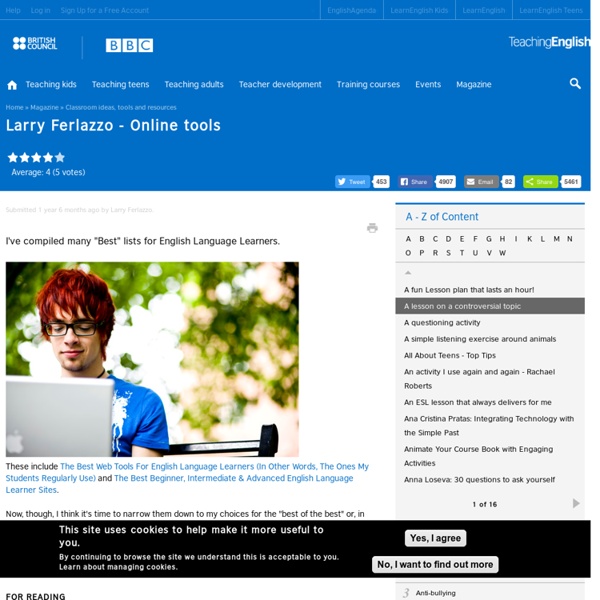High quality content and interaction in the ELT world
I don’t think I have ever taught or observed an advanced lesson that went seriously wrong. I mean cringe-worthy wrong. Which shouldn’t come as a surprise. After all, advanced students have been in the game long enough and know enough English to ensure that most of our lessons run – at worst – relatively smoothly. Except perhaps for those all-too-familiar “How do you say X?” questions (X = a word YOU don’t know), which they seem to pluck out of nowhere, at the worst possible moments.
14 Song-Based Lesson Plans and Activities
Although I know I like using music in my teaching, I never thought there would be so much of it on this blog when I started it over a year ago. Songs are fun, authentic sources with multiple possibilities in the classroom, but the main reason for having published 14 lesson plans and activities based on songs here is to a large extent due to copyright issues: while lyrics and songs are easily available for everyone online, access to other types of authentic texts is more limited because of copyright constraints. I also think the key to a successful song-based lesson is to deal with the text as you would with any other type of short text, whether written or oral, to practise a variety of comprehension skills, work on specific grammar and vocabulary, or introduce a topic for discussion. Choosing a song that meets the students’ needs is not always easy, though. Listening for specific information 1.
A Simple Notebook System for Classroom Management
Posted 03/04/2014 3:40PM | Last Commented 08/02/2017 10:23AM Image Credit: ©Shutterstock.com/Julia Tim Hi All, When I taught middle school, I tried lots of different methods for classroom management, but I found that basic notebooks were ultimately the thing that saved me, in two ways. I have videos on my website that explain both uses, but I'll summarize them here: First, notebooks served as an emergency brake when things got really bad.
Worksheet-free Vocab Revision Activities – Clare's ELT Compendium
What do you do in those last 5 minutes of class when you’ve finished everything that was planned? Or when energy levels hit a low during a lesson? Or in that lull while the next student gets ready to present, or whatever? We all know about the need to revise and recycle new vocabulary in language lessons, and in this post I want to share a few vocabulary revision activities that teachers can slot into any downtime that might occur in a lesson! I’ve built up my repertoire of this kind of quick review activity over the years, so many are borrowed or adapted from colleagues, and others are based on popular board games.
CristinaSkyBox: The Revision Game
Revisions just have to be fun! And FlipQuiz is a great tool to use for revising language or content. After signing up, one begins by creating a new quiz board, give it a name, and with the choice of six categories, there will be five questions for each. Then, for each question, the creator of the quiz board, adds the correct answer. Save, and it's ready to go.
Compound Words Foldable
Here is a simple foldable, that students can make, to demonstrate compound words. You can also use this same foldable to show contractions. All you need is A4 paper, scissors, and pencils. Like this: Like Loading...
Why won’t they speak?!
Following on from Monday’s lesson, I deliberately made sure that my intermediate class today would have lots of opportunities to speak, starting immediately with the first activity. I hoped this would make a difference to the atmosphere in the room, and briefly, it did. After a while though, regardless of what I tried to do to get a response, it seemed that nobody wanted to say anything. I’d done everything ‘right’: put them in pairs, given them thinking time, played music (at their request) so they weren’t speaking into silence, suggested possible answers (yes, no, maybe for some questions), given them chance to make decisions (do you want to listen to anything again, or shall we move on?) and was generally greeted with silence, increasingly so as the lesson progressed.
Countable and uncountable nouns
In this post, I try to explain what countable and uncountable nouns are. When I speak with native speakers of English they often tell me that the concept of countability in English is absolutely natural. “You simply know which noun is countable and which is not.”
Agent English
Do you have students that tend to dominate class discussion? Maybe quiet ones that have great ideas but tend to hold back? Do you want to engage your students in preparation for a reading activity?
Text summary and analysis
This is a great way to get Proficiency students (although it could be adapted for Advanced or FCE students) reading, finding useful vocabulary in the text and sharing it with each other. I got it from the inspiring Elspeth Pollock who gave a talk on teaching CPE students in Seville in February. She reminded us that proficiency students are (at least in Spain) pretty special students and this should be reflected in the classes. I have used her General Text Analysis handout and also adapted it to make my own for my class and I attach both here with her permission. Here´s what you do: After doing a class activity or exam practice on a certain topic, ask your students to go home and find an article in English on the same sort of general topic – something which interests them – and to follow the instructions on the handout. Even though there are instructions involved, the students are encouraged to read what they want and investigate and share what piques their interest.



